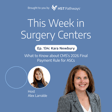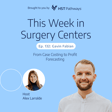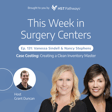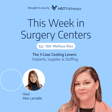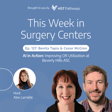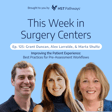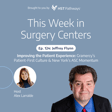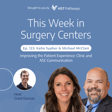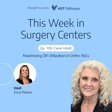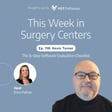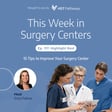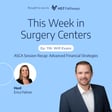Become a Creator today!Start creating today - Share your story with the world!
Start for free
00:00:00
00:00:01

Austin Cheng - Lowering the Cost of Care
For our first episode, we sat down with Austin Cheng, CEO of Gramercy Surgery Center, to chat about how ASCs can help lower the cost of healthcare. In our news recap, we’ll cover the fastest growing ASC specialty, healthcare worker strikes, and the average hourly pay for RNs per state.
Articles Mentioned:
Why cardiology is ASCs' next big thing
Strikes among healthcare workers in 2022
Hourly nurses pay for all 50 states
Parents of baby who spent 6 months in NICU ask his nurse to become his godmother
Brought to you by HST Pathways.
Transcript
Introduction and Guest Introduction
00:00:01
Speaker
Welcome to This Week in Surgery Centers. If you're in the ASC industry, then you're in the right place. Every week, we'll start the episode off by sharing an interesting conversation we had with our featured guests, and then we'll close the episode by recapping the latest news impacting surgery centers. We're excited to share with you what we have, so let's get started and see what the industry's been up to.
00:00:27
Speaker
Hi, everyone. Here's what you can expect on today's episode. We'll kick it off with a discussion between our host, Rafaela Kinsopi and Austin Chang, who is currently the CEO of Gramercy Surgery Center located in New York. They chatted about Austin's unique path to becoming a CEO and what it was like growing up around surgery centers.
ASC Industry Responsibilities and Impact
00:00:49
Speaker
His story is so interesting. Then they'll do a deep dive into the ASC industry's role when it comes to lowering the cost of care.
00:00:58
Speaker
Austin really shares some great insights into how we can all work together and how it's all of our responsibility to make healthcare more affordable. We'll then close the episode with a few news stories covering everything from the fastest growing ASC specialty, the healthcare worker strikes taking place across the country right now, and then an interesting list that ranks the average hourly pay for registered nurses and nurse practitioners per state.
00:01:27
Speaker
So if you ever wondered how your pay compares to those in neighboring states, today is your lucky day. So I hope everyone enjoys the episode and here's what's going on this week in Surgery Centers.
00:01:45
Speaker
All right. How's it going, everyone? I am your host today here on This Week in Surgery Centers, Raphael Kintsepe. And today we are joined by fantastic guest, Austin Cheng. He is the CEO of Gramercy Surgery Center out of New York.
00:02:02
Speaker
They have recently been ranked as the number one and number two surgery centers in this state. They've got a location in Manhattan, as well as a location in Queens. And today we're going to be talking with Austin a little bit about how ASEs can contribute to decreasing the cost of care within healthcare. So we're pumped to have Austin on. Thank you so much for joining us. How are you doing?
Gramercy Surgery Center's History and Leadership Transition
00:02:25
Speaker
I'm doing great. Thank you so much for having me. Really, really.
00:02:29
Speaker
Um, love, uh, speaking about healthcare all the time, 24 seven, actually. So, um, thanks for the opportunity for, uh, for, for being on the podcast. Awesome. Before we kind of get rolling, um, for anyone who isn't familiar with you or familiar with Gramercy, is there anything about you or your surgery center you'd like to, to kind of share with some of our listeners? Yeah. I'd love to give a, a background on the facility. Um, so we were, we were founded in 2006. Uh, it was actually founded by my mother.
00:02:59
Speaker
So at the time, it was the first woman-owned multi-specialty-founded surgery center. So it was a really big deal, you know, I think just for the healthcare infrastructure. New York is a CON state, so she applied for the CON, and she got it. It was also a little unusual because she was not a surgeon. So really, she spent a lot of time figuring out what the surgeons and patients
00:03:29
Speaker
in their surgery center so that she could keep the surgeons happy, especially because they were not owners starting out. And yeah, for me, it was also a big deal personally, just because very soon it was just all she talked about at the dinner table, sports matches, just taking phone calls and all that. That comes with running a business.
00:03:58
Speaker
Yeah, so operating and managing surgery centers really is part of my life growing up. Awesome. Yeah. So I took over in 2020. Unfortunately, my mother passed away, but I had the ability to transition in. I was a practicing lawyer, so I had a conversation with her
00:04:28
Speaker
And I told her that I would do my best to sort of take on the mantle of leading Gramercy, try to take it to the next level, especially in light of everything that's happening in healthcare. We decided I was a good fit, not just a legal background, but just because I kind of grew up with the business. So I slid in and she unfortunately passed in February of 2020.
00:04:57
Speaker
But I had a great team here to sort of guide me and welcome me in, or I should say welcome me back because I worked here while I was in law school. And then COVID hit for, you know, two to three years. I think President Biden just said we're, we've, mission success. Yeah, so that was my introduction to truly, you know, managing and leading a surgery center. I think three weeks later,
00:05:27
Speaker
we had shut down. So it's been definitely a hectic time for me and the team here, but it's been very, very rewarding. Yeah. Awesome. Awesome. Well, I appreciate you giving us some great background there. And, you know, sorry to hear about the passing of your mother, but it sounds like she was a fantastic person, a great trailblazer in terms of leading kind of women led surgery centers in the state. So that's fantastic.
00:05:56
Speaker
For you as someone who grew up around surgery centers and kind of, it sounds like, you know, your mom was influencing and kind of sharing a lot on the surgery center.
Challenges in Leading a Surgery Center
00:06:04
Speaker
For someone who grew up in this space and is now in a leadership role, and especially someone coming from another background where you were practicing law and then coming into a surgery center, what's that experience been like for you and kind of, you know, what are some of those things that you found interesting or challenging? Yeah. So a,
00:06:23
Speaker
I tried to get all the secrets out of my mother before she passed, but you just can't do that. And I don't think anybody can really prepare you fully for the role of being the CEO or administrator of a surgery center because it is a lot. And I saw that sort of from the outside looking in, just as her son, family member, seeing all the hours she put in, all the different
00:06:51
Speaker
topics that need to be covered, the regulatory, just run of the mill, running of business issues. But then on top of all that, all the health care nuances. So I definitely knew it was a lot, but I don't know that I knew it was as much as it is. And I'm sure any service center administrator who's listening will say yes, of course.
00:07:18
Speaker
or the firefighters of the surgery center, we put out fires every single day. That sounds spot on. I feel like every time I talk with someone leading a surgery center, I am always surprised by the number of things that they're able to cover in a day. I'm sure it's been a fantastic, but a whirlwind of an experience. Awesome. I appreciate that. Thinking about some things we talked about in prepping for our call today, and some of the topics our listeners are really interested in,
00:07:47
Speaker
You know, it seems like one of your passions is around kind of the impact that you can have in terms of lowering the cost of care in your time now in leading Gramercy. You know, what are some of the things that have surprised you so far in terms of kind of how the cost of care works between payers and patients and reimbursements? And just kind of what are some of your thoughts on that?
Mission to Lower Healthcare Costs
00:08:10
Speaker
Yeah, so that was one of the reasons why I wanted to kind of come back and continue on the legacy of running Gramercy Surgery Center. Obviously, I wanted to make my mother proud and have her see that I can continue on running the facility and leading the team here. But something else that I thought was very interesting was not just Gramercy Surgery Center, but all
00:08:40
Speaker
you know, outpatient ambulatory surgery centers, they have the capacity to lower the cost of health care in our country dramatically. You know, there are tons of studies, literature on, you know, the actual figure. But that has, you know, very quickly become a passion of mine. It's sort of become a mission on top of, you know, the mission of taking care of patients and our surgeons here.
00:09:09
Speaker
But it is sort of like we're working to fix the healthcare system and heal the healthcare system in a sense as well. Something that, you know, I think is interesting is that there's not necessarily a full understanding and awareness of the cost of healthcare.
00:09:32
Speaker
There are a lot of things that contribute to that. People don't necessarily know what the pricing of a procedure is. Even the providers themselves don't know how much they're going to get paid, right? So imagine going to another industry and saying, hey, when you walk in for a coffee, you don't know how much you're going to pay for that coffee. And you don't even know if you're going to get coffee, right? So I think it boggles some people's mind, the way that health care works.
00:10:02
Speaker
But at the same time, I think it's an opportunity, right? It's an opportunity to really hone in on the inefficiencies and do our best to fix it where we can. So yeah, I like to share with the clinical team here. Of course, we're taking care of the patient and providing the number one
00:10:28
Speaker
number one and number two service in New York. But at the same time, we're also lowering the overall cost of healthcare. And if a patient has Medicare or Medicaid as their insurance, that's taxpayer money we're receiving. And a lot of it is performing surgeries at the right time, in the right setting.
00:10:58
Speaker
So I think people understand that, or I don't know if people understand, procedures that are performed in hospital outpatient departments typically are twice as expensive. Sometimes it's the same exact surgeon who's performing the surgery, right? But just by the virtue of it being performed at a surgery center, the insurance plan is paying half as much.
00:11:27
Speaker
So I think it surprises me how confusing it is, but at the same time, how much opportunity there is for us to fix this. Yeah, that makes a ton of sense. I think you hit a couple really key points there. One in terms of, as someone on the other side of as a patient, that gap in terms of understanding the cost of what your health care, whether it's a procedure or just even going for a general doctor's visit,
00:11:53
Speaker
that gap in understanding that the cost of care is a huge factor there. And I think that point that you hit secondly there in terms of the differences between the cost of going to an outpatient department in a hospital versus what you get with a surgery center is pretty dramatic. In your experience, how did you communicate that within the community? We've already kind of mentioned it that Gramercy was named the number one and number two surgery centers in the state of New York, which is fantastic.
00:12:21
Speaker
Do you feel like within the state and within the specific communities which you operate, Manhattan and Queens, that there is a good understanding of kind of the value of a surgery center from a cost standpoint? Yeah, so I think that is a difficult question because there are so many communities out there. So I think that the answer to that question is dependent on each specific community. There might be some communities
00:12:51
Speaker
where the benefits of a surgery center are well known and respected. And I'm sure there are some communities or states where surgery centers are still struggling to sort of make their presence felt and struggling to really maximize their benefits for whatever reason, a number of reasons. So I think
00:13:21
Speaker
At least where I'm from, New York, we have a very heavy health system presence here. We've got a few hospitals that are pretty heavy hitters, excuse me, heavy hitters. And they're great health systems, but I think in a market or an environment like that, patients sort of in their mind, they think, okay, when I need surgery, I need to go to the hospital.
00:13:51
Speaker
And that's sort of ingrained in their minds. So I think part of what surgery centers need to do is really educate, and again, this is all community dependent, educate the community on the presence of surgery centers, the benefits, and really that we are part of the healthcare ecosystem and infrastructure.
00:14:15
Speaker
Awesome. That makes a ton of sense. I definitely think the education and awareness factors there are huge in terms of getting communities kind of behind and aware of the opportunity they have with the surgery center.
Partnerships with Payers
00:14:25
Speaker
When you think about some of those things in addition to kind of the things that you can do as a surgery center, what are some of the things that you think that surgery centers can do to directly help lower some of that healthcare cost and what are some of the things you'd want other surgery centers to be thinking about? Yeah. So,
00:14:44
Speaker
I think, and this sort of goes back to an earlier question you asked, which is what surprised me. I think a lot of people view payers as, you know, they're bad, right? They sort of make healthcare a little bit more difficult. But from what I found, you know, at least running
00:15:11
Speaker
for the past three years is that we actually are aligned with some of these payers a lot more than you would think, right? They are trying to lower the cost of healthcare because they're the ones paying for it, right? And what we represent is a lower cost side of care. So really we're aligned in that work. So that I think is something that surgery centers should really think about.
00:15:39
Speaker
We represent a solution and answer to a pain point, which is rising unsustainable rising cost of healthcare. How do you stop that? There's a few areas in our national healthcare costs where the costs are ballooning.
00:16:02
Speaker
you know, drugs and pharmaceuticals, chronic disease management. Another one is surgery, because, you know, a patient shows up and in a single day, their health care costs for the year, you know, skyrocket 10, $20,000, $30,000. Right. So, so I think one thing that I would say to surgery centers is, you know, the payers are not necessarily an enemy, even though sometimes they might frustrate, you know, as they
00:16:32
Speaker
they are actually aligned with us and I think working with them, you can really do a good job of creating a workflow that takes care of the patient, you know, minimizes frustrations for the surgeons and then lowers the overall cost of care.
00:16:51
Speaker
Awesome, that's fantastic. I feel like you're giving so many great perspectives there that people can take as direct nuggets for them to apply within their surgery centers. And also, I imagine for many patients, it's very hard for them to have a good sense of awareness on kind of how these factors impact their costs. So a lot of what you hit there in terms of the knowledge, the awareness, and kind of the structure of the relationship between the surgery centers
00:17:18
Speaker
their patients and the payers, it's really important that people have a sense of that. So I think you kind of nailed it on the head there. You know, as we kind of get closer to the close of this, I'm thinking through what are some of those key tips, you know, are there any other additional tips like that that you want to share for any surgery centers out there, anyone leading a surgery center? Yeah, I would think, you know, I would just say that a lot of what we've done recently in working with
00:17:46
Speaker
partnering with payers and in partnering with self-funded, self-insured companies who are trying to create these health benefits designs for their employees. A lot of what we've done is based on data. So you really need the ability to capture and harness and present the data in a way that supports your
00:18:12
Speaker
I sound like a lawyer here, so I hate that, but it supports your argument. You can't do that if you're on paper. You can't do that if your system that gathers the data for you is not working properly. You really got to spend the time to make sure that that's all set up properly.
00:18:38
Speaker
You look at the data, and then you can very quickly start to understand where you can add value to a relationship with either a payer or perhaps a self-funded company. We have a union that utilizes our survey centers, and our value proposition to them was, hey, let's look at the reimbursements that we sort of charge out as our facility.
00:19:07
Speaker
This is likely what you're charging out if the members of your union are going to the hospital. This is the level of savings that you would benefit from if that volume were to shift out of the hospital. You do that with one simple CPT code. For this union that I'm talking about for that relationship, we started with the very bread and butter
00:19:34
Speaker
uh, outpatient surgery, which was a cataract. Um, you know, it's very, very difficult for, um, anybody to say that, you know, a cataract procedure has to be done in the hospital. I, you know, I think we've sort of went through the evolution of, of cataracts leaving, uh, you know, hospital, um, settings and you go into surgery centers. So everybody's comfortable with that concept. And then you, and, and so you, you say, okay, um, this is,
00:20:03
Speaker
you know, this is the cost savings that can happen if you move all that volume out of the hospital. And that's just with one CPT code, right? Imagine we do this with, you know, all the different specialties we have at our facility. At Gramercy, I think we're just shy of 12 different specialties. So imagine we did this, you know, and we spread that across all the different specialties, you know, for your members.
00:20:32
Speaker
And now you're talking millions of dollars that a self-funded company or plan is able to save and that's money. Hopefully they drive it into their healthcare for next year, but I don't know, maybe they'll have a nice Christmas party at the end of the year. That's up to them. The point is that they have that money that they can spend. So yeah.
00:20:59
Speaker
That's a long-winded response, but I think I would share with surgery centers that it all starts with the data and the workflow to capture that data and present that data. And once you have that, the world's your oyster. You can really start forging these relationships and these partnerships and backing up what you're saying with facts.
00:21:24
Speaker
Awesome. Awesome. That's fantastic. Austin, I have appreciated this time that we've had a chance to go through with you right now. It feels like there's so many great nuggets that I'm walking away with and I feel like our listeners are as well. One of the things that we do every episode with all of our guests is that we ask them, we've talked a lot about the relationship with payers. We talked about impacting.
00:21:47
Speaker
Cost but what is one thing that our listeners can do this week to improve their surgery center? Oh Improve their surgery center and she's that's a toughie. I definitely didn't Didn't see that question in the prep. So that's that's okay though. I I think You know to the point of data
00:22:15
Speaker
you know, run through, double check everything that's being put through the data analytics machine, whatever that is, whether that's the EMR or whatever software the facility uses. You know, I think perhaps think of one way to tweak any report to, you know, visualize the data in a different way. Yeah, I don't want to sound like a nerd, but I think
00:22:46
Speaker
It's really all about the data. One exercise that we actually went through recently that it might not necessarily help improve the operations of the service center, but I think is very eye-opening is, okay, everybody now understands that hospitals are twice as expensive as a service center on average.
00:23:12
Speaker
So, you know, take that Survey Center's revenue that they generated, you know, up to this point in time and multiply that by two. That's how much that would have cost the healthcare system if those procedures were done at the hospital. And you cut it in half, which is, you know, the same as the revenue of the Survey Center. That's how much money a Survey Center has saved the healthcare infrastructure, right?
00:23:41
Speaker
Um, it's not necessarily something that would improve, um, this, you know, the operations of the surgery center. Um, but I, I done that exercise with my team and I think it's, it's eyeopening to them because then they realize, um, wow, we're, you know, we're not only helping, you know, our patients, we're not only giving our surgeons, uh, you know, a good day. Um, but we're also helping to lower the cost of
00:24:10
Speaker
of healthcare for Americans. So yeah, I would recommend administrators or survey centers to go through that exercise. I think the team would really like it.
00:24:21
Speaker
Fantastic. I appreciate that, Austin. I feel like our listeners are going to have some great nuggets to take from that in terms of the value of data and the way that they can be able to kind of take advantage of that within their surgery centers.
Episode Highlights and Achievements
00:24:33
Speaker
So I appreciate your time today covering these topics on cost, on payers, and giving our listeners that nugget on what they can do this week. Huge congrats to you and all of your team members at Gramercy. And thank you so much for joining us on this week in Surgery Centers.
00:24:50
Speaker
Thank you. Awesome. As always, it has been a very busy week in healthcare, so let's jump right in. We have four stories for you today, and our first one comes from Becker's ASC. They published an article explaining why cardiology is the ASC industry's next big thing.
00:25:17
Speaker
And according to two different reports that were cited in the article, cardiology procedures actually received the highest estimated Medicare payment increase in 2021. So obviously that's super appealing. And that also makes cardiology the fastest growing ASC specialty. And it's projected that by the, in the mid 2020s, which are already at the end of 2022,
00:25:42
Speaker
33% of cardiology procedures will be performed in ASCs. So just letting that sink in, one out of every three cardiology procedures are projected to be performed in surgery centers by the middle of this decade. It's really interesting to think about this becoming reality. When you hear the word cardiac, most of us think of major surgery, something immediately life threatening,
00:26:10
Speaker
But of course, that's not always the case. So this shift can mean huge financial payouts for ASCs in the next few years. And right now, of course, we have some people already on top of it. There are some ASCs in management companies leading the charge here. Value Health, Atlas Healthcare Partners, Medaxium, and that's just to name a few. There are a ton others who are already making plans to improve patient outcomes and access to cardiovascular care in the ambulatory setting.
00:26:40
Speaker
So we will definitely be keeping a close eye on this, and this could be a really exciting change in advancement for the ASE industry.
Healthcare Worker Strikes and Salary Transparency
00:26:50
Speaker
Our second news story comes from Healthcare Dive. You may be dealing with this in your own communities right now, but healthcare workers are striking in several different cities in an effort to combat poor working conditions, low wages, unsafe workloads, and the list goes on.
00:27:11
Speaker
It's unfortunately the perfect storm. You know, if you think about hospital surgery centers and healthcare facilities of all types, they're all dealing with staffing shortages and retention issues right now. So if you combine that with the nurses and doctors and all healthcare workers who are struggling with, you know, day-to-day burnout, we talk about a ton, but also PTSD from COVID-19.
00:27:35
Speaker
And just this overall feeling that management and leaders are not hearing them and protecting them. Again, perfect storm, both sides kind of colliding here. And in 2022 alone, there have been strikes already in New York, Michigan, California, Minnesota, that have had thousands and thousands of healthcare workers participate in these strikes. And from what I can tell, they've really only been at the hospital level so far.
00:28:04
Speaker
However, it's obviously critical that AICs keep an eye on this and are constantly checking in with their staff and working with them the best they can to keep them happy, appreciated, and of course, employed. They want to be employed. We need them. So please check on your staff. Do what you can. And if you are located in a state that is currently where a strike is currently taking place, we do, of course, urge you to stay vigilant and just in the know about what's going on.
00:28:35
Speaker
Our third story, we just wanted to share some interesting numbers that Becker's ASC published on behalf of the US Bureau of Labor Statistics. The Bureau did what's called an occupational employment statistics survey. So it is a mouthful, but the data that they came out with is actually really interesting.
00:29:00
Speaker
They recently held a survey collecting the average hourly pay for nurses in the US and broke it down state by state. Obviously, salary transparency is something that has been coming up more and more in conversations and sharing what other people get paid, what benefits they have. It's perfect timing that we have this data. Let me share some of it with you. First, if we look at registered nurses alone,
00:29:28
Speaker
In the US, across the board, the average hourly pay for a registered nurse is $39.78. Some of you might be listening and thinking, that's it, or holy crap, but nonetheless, $39.78 is the average hourly pay for a registered nurse in the US. The highest paying state is California, coming in at $59.62.
00:29:59
Speaker
And then the second highest hourly wage is in Hawaii, and then the third is in Oregon. And the three lowest paying states in order are South Dakota, Alabama, and Mississippi. Now, obviously a lot goes into calculating these wages, and it's not necessarily apples to apples across the board, but it is interesting to see the numbers broken out like this. And then if we switch to nurse practitioners,
00:30:24
Speaker
The average hourly pay in the US obviously goes up a little bit and it's $56.75. And again, nurse practitioners, average hourly pay in the US is $56.75. The highest paying state is again, California coming in at $72.99. And then the second is New Jersey and the third is New York.
00:30:50
Speaker
and switching again to the three lowest paying states in order we have Tennessee, Alabama, and South Carolina. So to see the full list and to see where your state falls, check out the episode notes for the link to the full article. We'll make sure to include it.
Impactful Stories in Healthcare
00:31:08
Speaker
And to end our new segment on a very positive note, the Today Show shared a beautiful story about a NICU nurse who was asked to be a baby's godmother
00:31:20
Speaker
after spending six months caring for him and being such a blessing to his parents and such a resource for them and really helping them navigate that horrible time in their lives. Carly Miller was the nurse who is now baby Conrad's godmother. And thanks to Carly and her team, Conrad is now home and doing great. And their strong bond will live on, which is really, really sweet.
00:31:44
Speaker
Just one amazing story about a nurse who is changing lives, and I know there are thousands more out there. So that news story officially wraps up this week's podcast. Thank you, as always, for spending a few minutes of your week with us. Make sure to subscribe or leave a review on whichever platform you're listening from. I hope you have a great day, and we will see you again next week.
